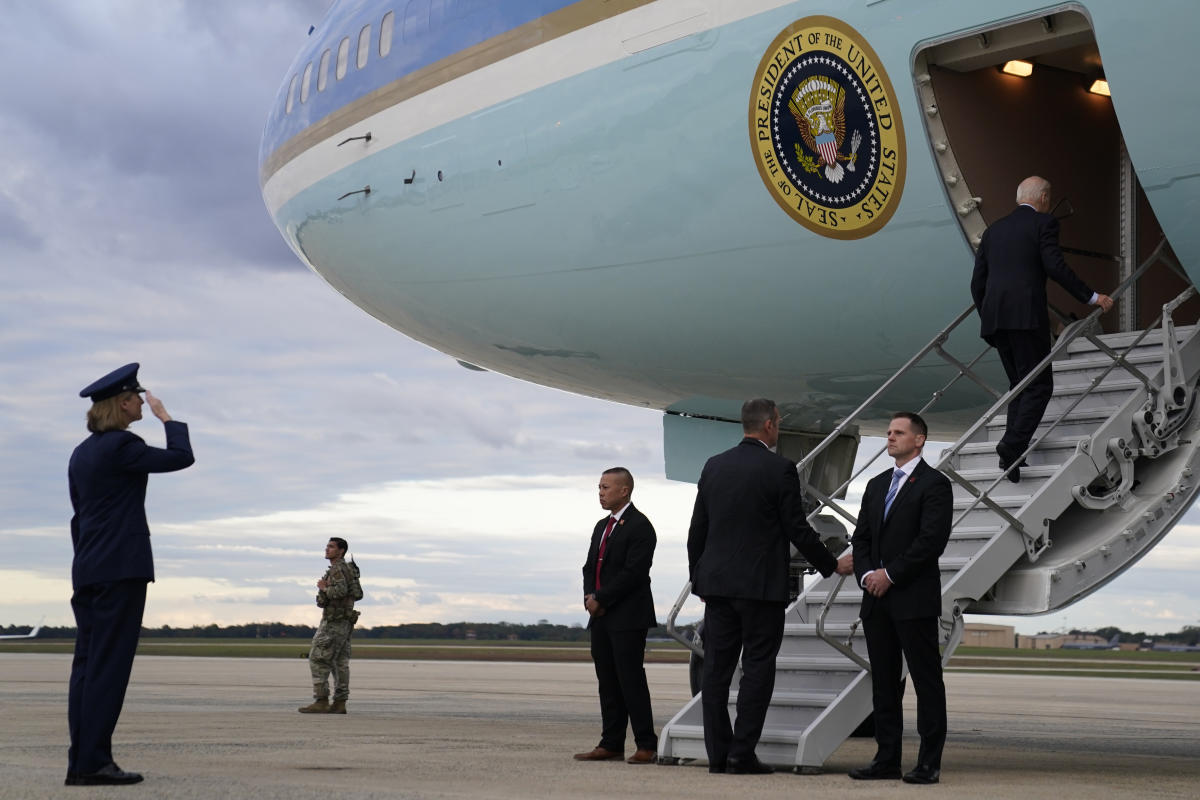#Biden will stress humanitarian aid, avoiding deeper conflict in Israel but is scrapping Jordan stop

The White House confirmed while Biden was preparing for takeoff from Washington that he now only plans to visit Israel. The Amman summit was scrapped after Palestinian leader Mahmoud Abbas withdrew in protest of the explosion, which the Hamas-run Health Ministry in Gaza blamed on an Israeli airstrike. The Israeli military said it had no involvement and pinned the blame on a misfired Palestinian rocket.
“This war and this aggression are pushing the region to the brink,” Ayman Safadi, Jordan’s foreign minister, told al-Mamlaka TV, a state-run network. He said Jordan would only host the summit when all participants agreed on its purpose, which would be to “stop the war, respect the humanity of the Palestinians, and deliver the aid they deserve.”
While aboard Air Force One on his way to Israel, Biden released a statement saying he was “outraged and deeply saddened by the explosion at the Al Ahli Arab hospital in Gaza, and the terrible loss of life that resulted.”
He said he spoke “immediately” after hearing the news with King Abdullah II of Jordan and Israeli Prime Minister Benjamin Netanyahu and said he has “directed my national security team to continue gathering information about what exactly happened.”
“The United States stands unequivocally for the protection of civilian life during conflict and we mourn the patients, medical staff and other innocents killed or wounded in this tragedy,” Biden added.
White House National Security Council spokesman John Kirby said officials haven’t yet determined blame, calling the situation “very dynamic, literally changing by the hour” and adding that it “wouldn’t be appropriate for us to react to initial reports one way or the other.”
“We’re not gonna get into the business of reacting in near real-time,” Kirby told reporters aboard Air Force One. He said Jordan declared three days of mourning after the hospital explosion and Biden understood the move and was part of a “mutual” decision to call off the Jordan visit.
The cancellation means Biden won’t meet with the Jordanian king, Abbas or Egyptian President Abdel Fattah el-Sissi. But Kirby said he’d have an opportunity to speak to the leaders by phone as he returned to Washington. The quickly shifting events reflect an increasingly volatile situation that will test the limits of American influence in the region.
In Israel, Biden planned to meet with Netanyahu and other Israeli officials, as well as Israeli first responders and the families of victims killed and hostages taken when Hamas made its incursion into Israel.
Biden’s decision to put himself in a conflict zone — the same year he made a surprise visit to Ukraine — demonstrates his willingness to take personal and political risks as he becomes heavily invested in another intractable foreign conflict with no clear end game and plenty of opportunity for things to spiral out of control.
The high-stakes presidential trip is emblematic of Biden’s belief that the United States should not turn back from its central role on the global stage and his faith that personal diplomacy can play a decisive role.
“This is how Joe Biden believes politics works and history is made,” said Jon Alterman, a senior vice president at the Center for Strategic and International Studies who worked on the Senate Foreign Relations Committee while Biden was a member.
There’s been no water, fuel or food delivered to Gaza since the brutal Oct. 7 attack by Hamas that killed more than 1,400 Israelis and triggered the unfolding war. Mediators have been struggling to break a deadlock over providing supplies to desperate civilians, aid groups and hospitals.
As the humanitarian crisis grows, so too does the concern of a spiraling conflict that stretches beyond the borders of Gaza. There have already been skirmishes on Israel’s northern border with Hezbollah, an Iran-backed group that’s based in Southern Lebanon.
“There’s a lot that can go wrong on this trip,” Alterman said.
Biden’s travels will be rife with security concerns, and visits by other U.S. officials have been disrupted by rocket launches into Israel. Additional Israeli airstrikes in Gaza could also prompt more condemnation at a time when Biden is intending to demonstrate solidarity with the United States’ closest ally in the region.
The U.S. has subtly shifted its message over the past week, maintaining full-throated support for Israel while slowly turning up the diplomatic volume on the need for humanitarian assistance in Gaza. Biden and aides have heard increasingly dire predictions about the potential for images of suffering Palestinians to ignite protests and broader unrest throughout the Middle East.
Kirby said Biden will press Israel to ensure that humanitarian aid reaches Gaza as soon as possible and flows continually after that. He said the president would seek to defuse tensions and try to ensure that the war doesn’t trigger a deeper conflict.
“He’s going to get a sense from the Israelis about the situation on the ground and, more critically, their objectives, their plans, their intentions in the days and weeks ahead,” Kirby said of Biden. “And he’ll be asking them some tough questions. He’ll be asking them as a friend.”
He added that the queries wouldn’t be “menacing or in any way adversarial.”
U.S. officials nonetheless said it has become clear that already limited Arab tolerance of Israel’s military operations would evaporate entirely if conditions in Gaza worsened.
Their analysis projected that outright condemnation of Israel by Arab leaders would not only be a boon to Hamas but would likely encourage Iran to step up its anti-Israel activity, adding to fears that a regional conflagration might erupt, according to four officials who spoke to The Associated Press on condition of anonymity to discuss internal administration thinking.
U.S. Secretary of State Antony Blinken, bouncing back and forth between Arab and Israeli leadership ahead of Biden’s visit, spent seven and a half hours meeting Monday in Tel Aviv in an effort to broker some kind of aid agreement and emerged with a green light to create a plan on how aid can enter Gaza and be distributed to civilians.
It was on the surface a modest accomplishment, but U.S. officials stressed that it represented a significant change in Israel’s position going in — that Gaza would remain cut off from fuel, electricity, water and other essential supplies.
Biden has a long track record of showing public support for Israel while expressing concerns privately to the Israelis about their behavior.
“He believes the only way to get inside the Israelis’ heads is to demonstrate profound empathy, but also to be there,” Alterman said.
In the U.S., Biden has won rare praise from Republicans over his leadership on Israel, but prospects for providing additional aid are uncertain. The administration has said it would ask for more than $2 billion in aid for both Israel and Ukraine, though House Republicans remain in disarray.
The Israel-Palestinian conflict has been ongoing for decades, and to a large extent, it’s involved the same cadre of men. Netanyahu is the longest-serving prime minister in Israeli history. Abbas has been Palestinian president for nearly 20 years. Abdullah II has been king since 1999 — Biden has called the Jordanian king a loyal ally in a “tough neighborhood.” El-Sissi is the newest leader, president since 2014.
With tens of thousands of troops massed along the Israel-Gaza border, Israel has been expected to launch a ground invasion — but plans remain uncertain. Meanwhile, the death toll is mounting. Israeli strikes on Gaza have killed at least 2,700 people and wounded more than 9,700, according to the Gaza Health Ministry. Nearly two-thirds of those killed were children, a ministry official said.
Another 1,200 people across Gaza are believed to be buried under the rubble, alive or dead. More than 1 million Palestinians have fled their homes — roughly half of Gaza’s population — and 60% are now in the approximately 8-mile-long (14-kilometer-long) area south of the evacuation zone, according to the United Nations.
___
Associated Press Writers Josh Boak, Will Weissert and Seung Min Kim in Washington, Josef Federman in Jerusalem and Matthew Lee in Amman, Jordan, contributed to this report.
If you liked the article, do not forget to share it with your friends. Follow us on Google News too, click on the star and choose us from your favorites.
For forums sites go to Forum.BuradaBiliyorum.Com
If you want to read more News articles, you can visit our News category.




